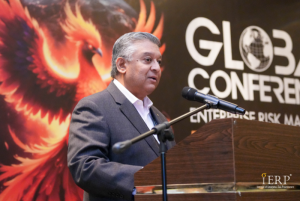@ the IERP® Global Conference, August 2023
Noting that there was confusion surrounding the Metaverse, speaker Jun C, began his presentation by defining what the Metaverse was. “It’s all about the virtual environment,” said the Chief Metaverse Officer of Virtualtech Frontier. His presentation, on navigating governance in the Metaverse and building a safe and inclusive digital frontier, covered the fundamentals of this virtual space, its uses and governance approaches. Describing it as a shared 3D virtual space where players can interact with each other and through ‘avatars,’ he also cleared up a few misconceptions about it, including the belief that it is a new concept.
He said the term was coined by author Neal Stephenson in 1992, in connection with a fictional, dystopian future world where people escape into an alternative, 3D reality. Today, the Metaverse encompasses a wide range of virtual worlds, platforms and technologies, each with its own rules and dynamics. The lines between the real and virtual world are blurred, leading to complex legal, ethical and social considerations. The Metaverse also has a global user base, resulting in diverse cultural norms, legal frameworks and expectations. What has become obvious, is its potential not just in entertainment, gaming, socialisation and education, but in commerce as well.
It is becoming an increasingly important platform for communication, collaboration, fostering virtual communities – and for commerce and data collection. Crafting governance solutions that take into consideration these complexities while ensuring consistent standards, is not something for the fainthearted. The Metaverse is already having an impact on brand and product engagements, webinars, virtual events, exhibitions and marketing campaigns. The application of the Metaverse platform enables personalised experiences, targeted advertising and the collection of user data. Governing interactions that influence both digital and physical realms add to the complexity.
There are additional issues as well, such as the loss of privacy and autonomy as personal data is increasingly collected and analysed; and the disruption of labour markets as more jobs are automated through the increased use of artificial intelligence (AI). All this has not deterred big businesses like Facebook from using the Metaverse more widely. “Facebook even changed its name to Meta,” Jun pointed out. “It changed from a social media platform to a Metaverse platform.” This, he added, reflects the companies’ belief that this is the future; an important platform through which they can reach out to the younger generation and communicate better, with more targeted information.
In the case of sportswear giant Nike, its use of the Metaverse has enabled fans to experience appearances of celebrity sports stars as well as acquire clothes and accessories, generating US$185 million in revenue in 2022. Due to the outreach of the Metaverse, appropriate governance will require a nuanced approach to accommodate various virtual environments. In such a diverse ecosystem, governance could be approached from the cybersecurity or user experience perspectives, Jun said. And when the lines between the real and virtual worlds blur, governing interactions in the digital and physical realms becomes complicated.
The diverse cultural norms, legal frameworks and expectations of a global user base will also require governance solutions that consider these factors, yet ensure consistent standards. “There is a gap in governance,” Jun said. “In the Metaverse, because of the nature of the data-rich environment, every interaction or potential touch point will offer an opportunity to collect data. But by doing that there will be a loss of privacy. The user may not be aware of this.” Privacy is essential as the Metaverse collects vast amounts of data for personalising experiences. Safeguarding personal information prevents misuse and maintains user trust.
He suggested that governance focuses on three aspects: interoperability, privacy, and safety & security. A risk framework for the Metaverse should be appropriate for its diverse ecosystem; a combination of different technologies is required. Also, because various technologies are being used, and different frameworks are being utilised, cybersecurity should be a key consideration. “This has to be top-notch when a user enters the system, so that there’s no worry about security breaches, fraud or cyberattacks,” he emphasised. “You have to study all components, then decide how to protect users when they access the technology.”
This will ensure that users can engage without fear of harm; negative experiences can deter user engagement. Appropriate governance structures are also integral to the protection of IP rights of the brands that are being marketed through the Metaverse environment. There is a need to ensure that the language used is appropriate as well, as the user base is a global one; and it is imperative that revenue streams are being generated legitimately. Among the components that Jun advocated for consideration was user empowerment. “Empower the users,” he said. “They need to know what the data is being used for when they enter the Metaverse.”
Stressing that privacy settings should be at the highest level as safety and security were key aspects, he acknowledged nevertheless that because it was a new industry, it still had a lot of grey areas, and the use of third-party software and technology was extensive. “Transactions need to be secure if these are being used, and aligned with the system in use,” he cautioned. He advocated two approaches to Metaverse governance: centralised and decentralised. Centralised governance is likely to produce consistent standards, controlled innovation and development, and guided experience with stricter enforcement.
Centralised governance of the Metaverse would likely see it under the control of a single ‘owner’ – a group of people or committee, key members or shareholders with an equal say or vote – who would have the final say about how the Metaverse would be structured and governed. Decentralised governance, on the other hand, would probably see more empowerment of the Metaverse user community, more flexibility and diversity, and decentralised Metaverse ownership. “Current digital solutions are not sufficient to satisfy needs,” Jun said. “But there are different challenges when it comes to establishing governance structures.”
To navigate the governance of the Metaverse, the major challenges should first be identified. These include security and safety – anything that will cause issues with the data being collected. It should be noted that user data can be collected in a multitude of ways. Simultaneously, the Metaverse is already being used by major brands because they believe in the technology, and that the younger generation will want to be more immersed and engaged interactively online. “Think of the Metaverse as having the interoperability and global connectivity for different brands,” he said. “It’s not just one framework; it’s several because users will go from one Metaverse to another, in the future.”


























